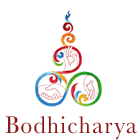View, Meditation and Action – Three Trainings for a Happy and Meaningful Life
This series of three talks was organised by Bodhicharya Algarve at Loule, Portugal. The first session is a general introduction to topic, View, Meditation and Action – Three Trainings for a Happy and Meaningful Life. In sessions 2-3 the topic is elaborated further.
The audio recording part 1 is with Portuguese translation, parts 2-3 are English only.
A SUMMARY
by Maggy Jones
Part 1
Brief history of the Buddha; his realisation that no-one, absolutely no-one can escape birth, old age, sickness, death. He looked for the solution. 1. People do not know the true causes of their problems. 2. We don’t know how to find the solution. We have the wrong view. In war there is so much suffering. Why do we have war? Greed, jealousy, fear… And we don’t learn. The opposite of greed and hate is love. We say we want people to be kind to us but we must also give kindness. To fulfil this we need to let go of our negative emotions. We need to train to let go of old habits and deal with issues in a new way. We must employ mindfulness, be aware of what our mind is doing; slowly, slowly we will have the confidence to change not only ourselves but also those around us. Q & A
Part 2
Buddha gave many types of teachings because people are different, one will understand one thing, another won’t but will accept another. There are 3 main Yanas (Skt) vehicles; 3 types of motivation. 1st wanting to be a better person’ 2nd have an idea of karma, interdependence and enlightenment. This is right view and we try to cultivate this and reduce the negative. But habits are strong. Our mind is like a “wild elephant driven by a drunk monkey”. We must tame our mind; counting your breaths may be helpful; different methods work for different people. Story about focusing on the positive and not the negative. Story of rabbit who was full of self-pity. Meditation and reflection can change our life. There will always be problems, do not let them control you, remember the two truths, and interdependence. The awareness is your consciousness, unborn and unceasing; out of this awareness all experiences arise.
Part 3
Q & A Nature of consciousness. Taming the mind through mindfulness and awareness. 3 types of Dharma practitioners. How to become a Bodhisattva; you cannot help a drowning person unless you can swim; likewise you must train in dharma. We must transform and that takes courage. Practice the 6 paramitas.* The 3 trainings – discipline, meditation and action; they go together not one after the other. Details of the Vinaya vows; if you take them, do not do this too earnestly. Vinaya are refraining from negative; Bodhisattva vows are doing the positive. Vajrayana are of the mind. All discipline must be self-discipline, not forced.
- Generosity; Good Conduct; Patience; Diligence; Meditation; Wisdom


